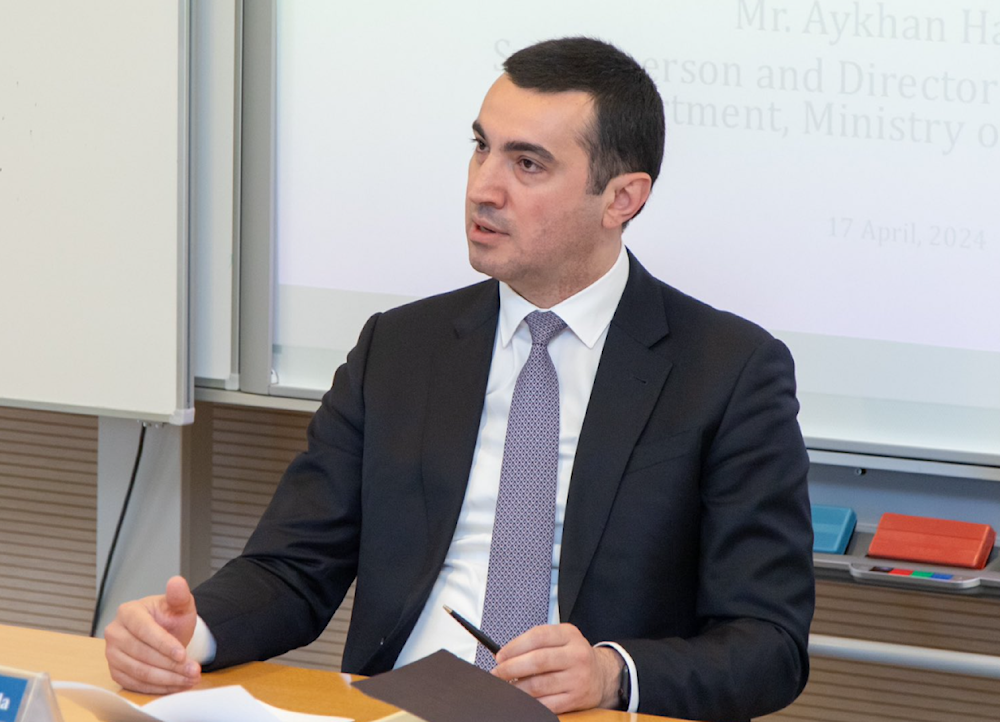Azerbaijan says Armenia agreed to 'historic' return of four villages
Armenia's Foreign Ministry announces that the two nations have struck an initial agreement on four portions of their contested border.
-

Aykhan Hajizada speaking with diplomats & academicians at ADA University in April 2024. (X photo @Aykhanh)
Azerbaijani Foreign Ministry Spokesperson Aykhan Hajizada announced Friday that Armenia has agreed to restore to Azerbaijan four villages on their shared border.
Hajizada wrote on X that the 4 villages occupied by Armenia since the beginning of the 1990s, calling their return a "long-awaited historic event."
‼️Long-awaited historic event: 📢
— Aykhan Hajizada (@Aykhanh) April 19, 2024
As a result of the 8th meeting of the State Commissions on the delimitation of the state border between #Azerbaijan and #Armenia, Armenia has agreed to return 4 villages of Azerbaijan that were under the occupation since early 1990s. pic.twitter.com/qoHA9urFKv
Armenia's Foreign Ministry announced that the two nations have struck an initial agreement on four portions of their contested border.
Azerbaijan has stated that the restoration of the villages is a vital precondition for a peace agreement to end more than 30 years of strife between the two nations, both former Soviet Union members.
The deal reached on Friday at a meeting led by both nations' deputy prime ministers was the clearest evidence of movement between the two parties so far.
Armenia-Azerbaijan ICJ battle to continue this month
As military tensions continue to increase between Azerbaijan and Armenia, both countries will battle out a long-running "ethnic cleansing" dispute in the gilded Peace Palace of the International Court of Justice from April 15.
The hearings will continue up until April 26, revolving around objections raised by both parties to each other's original cases filed in September 2021.
In September 2021, both countries filed suits against each other in one week and accused the other of "ethnic cleansing", as well as breaching the International Convention on the Elimination of All Forms of Racial Discrimination (CERD).
In December 2021, the International Court of Justice, whose orders are binding but with no way for enforcement, then ordered both parties to prevent incitement and promotion of racial hatred.
In 2022
In September 2022, Armenia requested the court to amp up its orders to "explicitly require" Azerbaijan to protect anyone captured during any armed conflict since 2020, a request the ICJ rejected.
Armenia then asked the court in December same year for additional "provisional measures" to push Azerbaijan to permit free movement along the Lachin Corridor, the only mountainous road into Karabakh from Armenia.
In 2023
In January 2023, Azerbaijan asked the court to stop Armenia from laying landmines and to permit it to remove landmines in the "Lachin and Kalbajar Districts," a decision the court refused a month later.
The court also ordered Azerbaijan to take "all measures at its disposal to ensure unimpeded movement" along the Lachin Corridor in February 2023.
In April 2023, Azerbaijan raised so-called "preliminary objections" to the court's jurisdiction, which were also raised by Armenia in objection to Azerbaijan's case on the same day.
Armenia later pleaded for a strengthening of the February 22 measures, asking the court to order Azerbaijan to withdraw all personnel from the Lachin Corridor on May 24, 2023, which the ICJ rejected.
September 2023
The International Court of Justice announced on September 29 that Armenia filed a lawsuit against Azerbaijan for racial discrimination against ethnic Armenians in Nagorno-Karabakh.
"The Republic of Armenia, referring to Article 41 of the Statute and Article 73 of the Rules of Court, submitted a request to the Court yesterday for the indication of provisional measures, 'to preserve and protect rights enshrined in the International Convention on the Elimination of All Forms of Racial Discrimination (‘CERD’)'," the court said.
"Armenia requests the Court to indicate the following provisional measures, and to reaffirm Azerbaijan’s obligations under the Orders it has rendered in this case, in particular those of 7 December 2021 and 22 February 2023," the statement added.
As of September 29, the spokesperson for the Armenian cabinet said 85,000 Nagorno-Karabakh residents had moved to Armenia since September 24.
This significant exodus of Nagorno-Karabakh's predominantly Armenian population began the preceding week in September after Azerbaijan declared the successful conclusion of its so-called "anti-terrorist" operation initiated against the breakaway region on September 19.
Following this declaration, Nagorno-Karabakh's authorities, with the mediation of Russian peacekeepers, agreed to disarm and relinquish all their weaponry to Baku the following day.
In November, the court ordered Azerbaijan to permit anyone wanting to return to Karabakh to do so in a "safe, unimpeded, and expeditious manner."

 4 Min Read
4 Min Read










